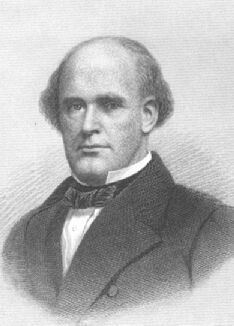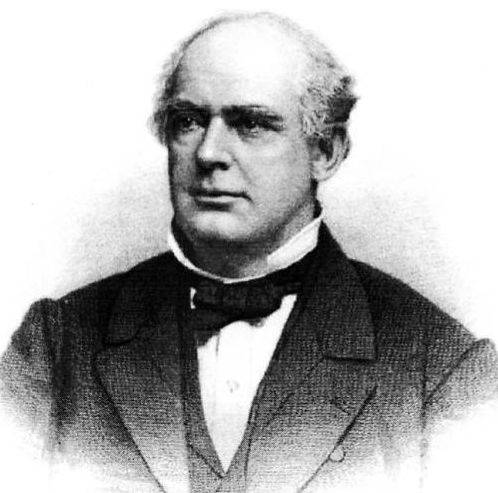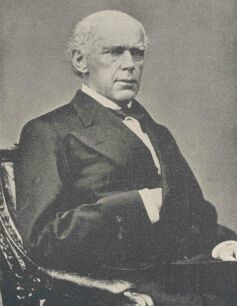Salmon P. Chase

(1808-1873)
New Hampshire & Ohio

Engraving by H.B. Hall, Jr.
—
frontispiece—
The Biographical Dictionary of Ohio of the Nineteeth Century
(Cincinnatti & Philadelphia: Galaxy Publishing Co., 1876)
William Turner Coggeshall, The Poets and Poetry
of the West: With Biographical and Critical Notices 167-169
(Columbus, Ohio: Follett, Foster and Company, 1860):
SALMON PORTLAND CHASE was born in the
town of Cornish, New Hampshire, on the thirteenth day of January,
in the year 1808. At the age of seven years, on the removal of
his father to Keene, he was taken to that town and placed at school.
At the age of twelve, his father having in the mean time died,
he sought the home of his uncle, Philander
Chase, then Bishop of Ohio, at Worthington, in this State,
and under that excellent and active man pursued his studies for
some time. Bishop Chase, having been elected to the Presidency
of Cincinnati College, removed to that city for the purpose of
entering upon the discharge of the responsible duties thus devolved
upon him, taking his nephew with him. Salmon entered the college
forthwith, and was soon raised to the Sophomore class. He continued
at Cincinnati only about a year, when he returned to the home
of his mother in New Hampshire, and in 1824 entered the Junior
class of Dartmouth College, where he was graduated two years after.
These several changes were not the most favorable to Mr. Chase's
education, but he improved his opportunities well, and graduated
with honor. The world was now before him where to choose, and
he was to be the artificer of his own fortunes. The winter succeeding,
he went to Washington City, and, receiving good encouragement,
opened a classical school for boys. This school was prosperous,
and he continued it for about three years, pursuing, at the same
time, a thorough study of the law, under the direction of' the
distinguished William
Wirt. Having been admitted to the bar of the District of Columbia,
and closed his school in 1829, he removed to Cincinnati in the
spring of 1830, and took up his permanent residence in that city-engaging
in the practice of his profession.
Working in that probation through which many sleep, Mr. Chase
soon made himself known as an earnest thinker, a good writer,
and a forcible speaker. He was an accepted contributor to the
pages of the North
American Review, an occasional writer for the Western
Monthly Magazine [Cincinnati, 1827-30], and a favorite member
of the intellectual associations and social circles of the city.
Among his contributions to the former periodical, which was at
the time regarded as the model American work in its department,
an elaborate article on "Brougham," and a dissertation on "Machinery,"
are remembered as having been received by the newspaper press
and the literary public with great favor. At this time he prepared
an edition of the Statutes of Ohio, with copious annotations
and a preliminary sketch of the history of the State, in three
large octavo volumes. The manner in which this work was performed
gave him an immediate reputation among the members of the bar,
and secured him almost at once a most desirable position in the
active commercial community by which he was surrounded. A valuable
practice soon sought him out; in 1834 he became solicitor of the
Bank of the United States in Cincinnati, and not long after that
assumed a like position in one of the city banks.
The first important case that brought him distinctly and prominently
before the public, outside of commercial practice, occurred in
the year 1837. This was a "fugitive
slave case," in which Mr. Chase acted as counsel for a colored
woman, claimed under the law of 1793. The same year, in an argument
before the Supreme Court of Ohio, in defense of James
G. Birney, prosecuted under a State law for harboring a negro
slave, Mr. Chase so acquitted himself as to add materially to
his already honorable reputation, and inspire general confidence
in his learning, skill, readiness, and power as a jurist. His
status at the bar was now an undoubted one. He took rank with
the oldest and ablest practitioners. But the very zeal with which
he entered into the cases referred to, and others of a kindred
nature—the thoroughness of his preparation, and the ability of
his argument—while they fixed his reputation as a lawyer, and
rapidly increased the business committed to his charge, at the
same time tended to draw him aside from the legitimate and most
successful practice of his profession, and start him in a new
and untried career.
The extension of the anti-slavery
sentiment, and his prominent connection with a class of cases
so nearly allied to it, together with the fact that this sentiment
was fast receiving vitality in organized forms, gradually drew
him into politics. Previous to the year, 1841, though ranking
with the young Whigs of Cincinnati, and acting with them, he had
never taken any thing like a prominent part in their movements.
During this year, his anti-slavery sentiments having been strengthened
by observation and reflection, and it appearing certain to him
that legitimate aims which he regarded as of paramount importance
could hope to be attained only through the instrumentality of
party organization, he united in a call for the State Liberty
Convention of Ohio, and subsequently for the National Liberty
Convention of 1843, in the proceedings of' both of which he took
a part whose prominence was surpassed by that of no other man.
Mr. Chase's political career was now fully commenced, and has
been continued with activity and ability ever since. He was chosen
a Senator
of the United States from Ohio in the year 1849, and served
his full term with much distinction. In 1855 he was elected Governor
of Ohio, and in 1857 re-elected—administering affairs with great
ability and prudence, and by his wisdom and devotion to the interests
of the State, commanding respect at home and abroad. In the beginning
of 1860 he was again elected to the Senate of the United States
. . . .
Judging Mr. Chase's future by his past, that section of the Union
to which he more particularly belongs, will have cause to congratulate
itself upon his re-election to the Senate, should it be in the
order of events that he is there to take the oath of office. Throughout
the Senatorial service which he has already rendered, the most
abundant evidence was afforded of his attachment to the great
and free North-West, whose interests he watched over with the
most jealous care. No narrow feelings of sectionalism, however,
control his actions; and when his responsibilities as Senator
are renewed, his vision, we are satisfied, will have a broad national
scope.
While a student of law, and during the first years of his practice
at the bar, history, biography, mechanics, politics and general
literature, each received a due share of Mr. Chase's attention.
And during the period embraced within the first three or four
years after attaining to his majority, few men of his years in
the country had better stored minds, or exhibited more striking
marks of good mental discipline. Though his education had been
several times interrupted, and was at best, more or less, piecemeal
in its nature, yet, through a mind comprehensive, discriminating,
and sufficiently retentive, he brought to whatever task he undertook
the graces of learning and the force of logic, and when he left
it, whether complete or incomplete, the evidences were abundant
of keenness of insight, extent of view, thoroughness of reflection,
and strength of reasoning. The same breadth of premise, exactness
of statement, logical sequence, completeness of consideration,
and power of conclusion, that have since, in a more remarkable
degree, characterized his career as a jurist and a statesman,
marked all his better efforts during the period under view. In
public discourses, newspaper writings, occasional lectures, and
contributions to periodical literature—in each of which departments
he did a few things carefully, and not many things "hastily and
with a bad pen"—these traits are observable.
During his student-life, Mr. Chase often wooed the muses successfully
. . . . Later in life, as a recreation, and from early love, he
has indulged in similar pastimes; and amid the turbulence of politics,
he often now flies for peaceful enjoyment to the quiet of a library
stored with the master songs of the world, ancient and modern.
Among recent literary recreations, in which we have known him
to engage, is the translation of various specimens of the Latin
poets into an English form, which present with striking excellence
the wit and beauty of the original.

Robert B. Warden, An Account of the Private Life and Public Services of Salmon Portland Chase (Cincinnati: Wilstach, Bladwin & Co., 1874)
Salmon
P. Chase
Biographical Directory of the United States Congress
Salmon P. Chase
Wikipedia
The Seventh Chief Justice
L.J. Bigelow, Bench and Bar: A Complete Digest
of the Wit, Humor, Asperities, and Amenities of the Law
(New York: Harper & Brothers, 1871)
Salmon
P. Chase
Birthplace & Boyhood Home
Biographical
Encyclopedia of Ohio of the 19th Century
The
Impeachment of Andrew Johnson
Chase:
Teaching History Online
Salmon
P. Chase
Chase Family Webpage
Chase
on the Flood of '32
On
the Road with Salmon Chase
Salmon
P. Chase
Secretrary of Treasury

Henry W. Scott, Distinguished American Lawyers, With Their Struggles
and Triumphs in The Forum
(New York: Charles L. Webster & Company, 1891)
Legal Argument
The Electric Telegraph. Substance of the argument
of S.P. Chase before the Supreme Court of the United States, for
the appellants in the case of H. O'Reilly, and others vs. S.F.B.
Morse, and others, on appeal from the Circuit Court for the district
of Kentucky (New York: Baker, Godwin, 1853)
[online
text]
Journals, Correspondence & Papers
John Niven (ed.), The Salmon P. Chase Papers
(Kent, Ohio: Kent State University Press, 1993-1998)
Salmon P. Chase, Diary and Correspondence of Salmon
P. Chase New York: Da Capo Press, 1971)
David Donald (ed.), Inside Lincoln's Cabinet: The
Civil War Diaries of Salmon P. Chase (New York: Longmans, Green,
1954)
Writings
Salmon P. Chase, A Preliminary Sketch of the History
of Ohio (Cincinnati: Corey, 1833)
Salmon Portland Chase & Charles Dexter Cleveland,
Anti-Slavery Addresses of 1844 and 1845 (Philadelphia: J.
A. Bancroft and Co., 1867) [online text] (New York: Negro Universities Press,
1969)
Bibliography
Harold M. Hyman, The Reconstruction Justice of
Salmon P. Chase: In Re Turner and Texas v. White (Lawrence:
University Press of Kansas, 1997)
John Niven, Salmon P. Chase: A Biography (New
York, Oxford University Press, 1995)
J. W. Schuckers, Life and Public Services of Salmon
P. Chase (New York: D. Appleton, 1874)(New York: Da Capo Press,
1970)
Robert B. Warden, An Account of the Private Life
and Public Services of Salmon Portland Chase (Cincinnati: Wilstach,
Baldwin & Co., 1874) [online text]
Albert Bushnell Hart, Salmon Portland Chase
(Boston: Houghton Mifflin Company, 1899) [online text]
Arthur Meier Schlesinger, Salmon Portland Chase:
Undergraduate and Pedagogue (F.J. Heer Printing Co., 1919) [online text]
Bibliography: Articles and Biographical Profiles
Gordon A. Christenson, A Tale of Two Lawyers in Antebellum
Cincinnati: Timothy Walker's last Conversation with Salmon P. Chase,
71 U. Cin. L. Rev. 457-492 (2002)
Donn Piatt, Salmon P. Chase, 143 North American Review
599-615 (December, 1886) [Donn Piatt, like Chase, was a
lawyer and an a poet]
N.S. Townshend, Salmon P. Chase, 1 Ohio Archaeological
and Historical Quarterly 111 (September, 1887) [online
text]
"Salmon Portland Chase," in Henry W. Scoll, Distinguished American Lawyers with Their Struggles and Triumphs in the Forum 133-142 (New York: Charles L. Webster, 1891) [online text]

Library of Congress
Research
Salmon
P. Chase Papers
University of Virginia
Charlottsville, Virginia
A
History of the Republican Convention in Philadelphia
|



